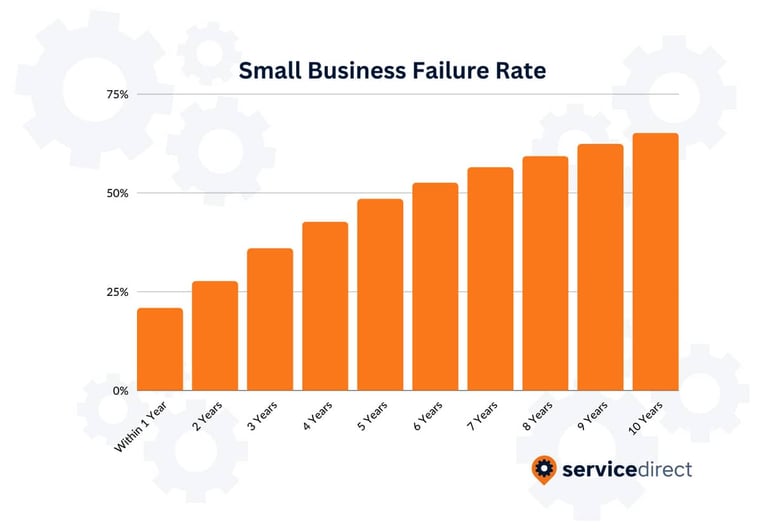How to Start an HVAC Business
Are you ready to turn your passion for HVAC systems into a lucrative business venture? Starting your own HVAC business can be a rewarding journey, offering a chance to provide essential services while building a profitable enterprise.
In this blog, we will explore the key considerations for aspiring entrepreneurs looking to establish a thriving HVAC business. From learning about the services you should offer and the profitability of HVAC businesses to acquiring the necessary certifications and avoiding typical pitfalls, we will guide you through the crucial steps to launch and grow your HVAC business.
With the right knowledge and strategic planning, you can carve out a successful niche in this dynamic industry!
Can you make money With An HVAC Company?
Owning an HVAC business can be highly profitable due to several factors and industry trends. Here are some key points highlighting the profitability of owning an HVAC business:
- Consistent Demand: The demand for HVAC services remains steady, driven by the need for heating, cooling, and ventilation in residential, commercial, and industrial buildings.
- Stable and Growing Market: The median pay for HVAC professionals in 2021 was around $50,000, according to the Bureau of Labor Statistics. Additionally, the industry is expected to grow 5% between 2021 and 2031, which is as fast as average for similar industries.
- Energy Efficiency Focus: With a heightened focus on energy efficiency and environmental sustainability, customers are seeking energy-efficient HVAC solutions. This presents an opportunity for HVAC businesses to provide energy-efficient upgrades and capitalize on the growing market for environmentally friendly solutions.
- Maintenance Contracts: Establishing maintenance contracts with customers can provide a recurring revenue stream because can help build long-term relationships with customers, leading to a stable source of income for the business.
It's important to note that the profitability of an HVAC business can vary depending on factors such as location, competition, business size, and more. So take the above information with a grain of salt and be sure to do your research before diving headfirst into running any type of business.
The Types of Services That New HVAC Companies Should Offer
New HVAC companies should consider offering a range of essential services to meet the needs of their customers.
Here are some common services that new HVAC companies should consider providing:
- Installation and Replacement: HVAC companies should offer professional installation and replacement services for heating, cooling, and ventilation systems. This includes installing new HVAC units, ductwork, thermostats, and related equipment.
- Repairs and Troubleshooting: Prompt and efficient repair services are crucial for HVAC companies. You should be able to diagnose and fix issues with HVAC systems, including problems with heating, cooling, airflow, and mechanical components.
- Maintenance and Tune-ups: Providing regular maintenance services helps optimize the performance and longevity of HVAC systems. This involves cleaning, inspecting, and tuning up the equipment, as well as replacing filters, lubricating moving parts, and checking electrical connections.
- System Upgrades and Retrofits: Offering system upgrades and retrofits allows HVAC companies to cater to customers' evolving needs and provide energy-efficient solutions. These solutions are increasingly important as energy-efficient technology improves and becomes more accessible.
- Duct Cleaning and Sealing: HVAC companies can offer duct cleaning and sealing services to improve airflow, energy efficiency, and indoor air quality. Cleaning and sealing ductwork help remove contaminants, prevent air leaks, and enhance overall system performance.
- Indoor Air Quality Solutions: Providing solutions to address indoor air quality concerns is essential. This may include installing air purifiers, humidity control systems, UV germicidal lights, and other technologies that help remove pollutants and allergens from the air.
It's important for new HVAC companies to assess the market demand in their specific area and tailor their service offerings accordingly. Additionally, staying updated with industry advancements, such as smart home integration and energy-efficient technologies, can provide a competitive edge in the market.
Licenses and Qualifications You'll Need to Start Your HVAC Company
As with starting any business, there are several certifications and qualifications that are typically required or recommended when opening an HVAC company. These regulations are primarily in place to ensure compliance, professionalism, and competence.
Here are some important certifications and qualifications to consider:
- HVAC Contractor License: Obtain a state or local license to legally operate as an HVAC contractor.
- EPA 608 Certification: Get certified to handle refrigerants safely and responsibly.
- Manufacturer Certifications: Consider obtaining certifications from HVAC equipment manufacturers to gain knowledge and expertise with specific products.
- NATE Certification: Consider NATE certifications, which validate technicians' skills and knowledge in various HVAC areas.
- Trade School or Apprenticeship: Completing HVAC trade school or apprenticeship programs provides foundational knowledge and practical experience.
Remember, certification and qualification requirements can vary depending on your location and the specific services you plan to offer.
It's essential to research and comply with the regulations and licensing requirements applicable to your area to ensure a legitimate and professional operation for your HVAC business.
Common Mistakes to Avoid When Starting an HVAC Business
One of the best ways to set yourself up for success when starting an HVAC business is by being aware of the pitfalls that many new business owners make. And with 20% of small businesses failing in their first year, you'll want to avoid mistakes as much as possible.
By keeping these top of mind and doing your best to avoid them, you’ll already be ahead of the competition!
Insufficient Planning
Failing to develop a comprehensive business plan can lead to challenges down the road. Plan your business structure, target market, services, pricing, marketing strategies, and more to get ahead. A well-thought-out plan will guide your decisions and increase your chances of success.
Underestimating Startup Costs
Many new HVAC business owners underestimate the initial investment required. Consider equipment, vehicles, licenses, insurance, and more to ensure you have enough funds to cover startup costs and sustain your business until it becomes profitable.
Lack of Marketing and Branding
Neglecting marketing efforts can hinder your business growth. Investing in marketing strategies like lead generation, social media presence, professional websites, and search marketing will help you avoid this pitfall and generate leads.
Indadequate Financial Management
Poor financial management can lead to cash flow problems and hinder your business's sustainability. Keep accurate records, track expenses, manage invoices, and plan for taxes. Consider hiring a professional accountant or utilizing accounting software to stay on top of your finances.
Not Prioritizing Customer Service
Providing excellent customer service is crucial for building a loyal customer base and generating referrals. Respond promptly to inquiries, communicate clearly, and ensure your technicians deliver quality service. Prioritizing customer satisfaction will contribute to your company's reputation and success.
Neglecting Continuing Education and Development
Failing to invest in ongoing training and education for yourself and your employees can hinder your competitiveness. Stay updated with industry advancements, attend workshops, and encourage certifications. Continuous learning ensures you can offer the latest solutions and provide exceptional service to your customers.
A Step-by-Step Guide to Starting AN HVAC Company
Clearly, there's a lot to consider when you're thinking about starting an HVAC business. Once you've decided to pursue it, how exactly do you go about forming and launching a business?
Here are 11 key steps to take when starting your own HVAC company:
- Research your local HVAC market
- Write a business plan
- Get the necessary certifications
- Register your HVAC business
- Open a business bank account for your company
- Acquire tools, equipment, and a business location
- Obtain proper insurance to protect your business
- Hire a great team
- Create your company's marketing plan
- Build a professional network in the industry and local community
- Provide great service
Check out our detailed Step-By-Step Guide to Starting an HVAC Business for a deeper look at what each of these steps entails.
Conclusion
Starting an HVAC business can be an exciting and rewarding endeavor. By following the right steps and avoiding common mistakes, you can set yourself up for success in the competitive HVAC industry.
Remember, success doesn't happen overnight. It takes dedication, hard work, and continuous learning to thrive in this field. But if you follow the steps outlined in our in-depth guide, you’ll be well on your way to owning a thriving HVAC company.





